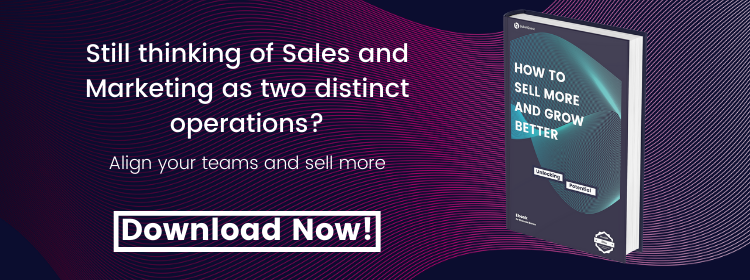What's the importance of proper sales qualification in B2B sales enablement and how could better qualifying your leads and prospects help your reps to operate more productively and close more deals?
I had a conversation with a prospect the other day. It was going well and we were learning lots about each other when all of a sudden the prospect told me he felt that some of the questions I was asking felt a little intrusive and he felt like I was trying to 'qualify' him.
There followed an interesting conversation where I explained that, absolutely I was trying to qualify him and his company, and we had a really interesting chat about why it made sense for both of us. I thought it might make an interesting post both for people who are buying B2B services and people selling them.
The importance of proper sales qualification in B2B sales enablement

Proper qualification of a prospect is a skill that I think should be covered in the first training session for every single person taking an inbound sales approach. It's a skill set that may feel slightly intrusive at first but it's one that saves everyone's time.
Have you ever got to the end of your sales process, sent a proposal or signature and then wondered why the prospect went dark?
It's probably because you didn't qualify your prospect properly. Think about a recent prospect that disappeared from the radar for no apparent reason and read the rest of this post with that prospect in mind.
Finding the right 'fit'
One problem or challenge may have a myriad of solutions from a vast range of solution providers. This is especially true in the B2B space, where buyers today face a real information challenge. The key to everyone being happy with the outcome of buying/selling a solution is a good fit between buyer and seller.
No buyer wants to blow their whole budget on a big, expensive solution to a problem when a smaller cheaper solution will do. No seller wants to sell the wrong thing to the wrong person and spend so much time dealing with the fallout that they don't make money from the sale...
...OK, some do, but often this is a consequence of the way companies remunerate their salespeople. The chance of a bigger commission cheque or hitting a bonus threshold can make even the best of us make decisions that are not beneficial to all parties involved (a discussion for another day).
Finding 'fit' at the beginning of the process makes everything much easier and much less like being sold to. And if there's no fit, both parties should be prepared to walk away.
No more being sold to
Almost everyone likes buying things, but no one likes feeling sold to. It’s pressured, unpleasant and often results in a binary yes/no decision: I went to the shop to buy a jumper, the salesperson hung around and kept asking me if I liked the jumper. I felt under pressure so I left without buying.
Proper qualification at the beginning of any sales process means that the buyer and the seller are on the same page throughout. Once they discover a fit they are on a journey together to find the right way to implement a solution to a problem. There's no more being sold to because there's no need. If it's right for both parties, it makes sense to do business.
How to improve sales qualification (overnight)
Effective deal strategy depends on proper sales qualification. I've written a list of some of the important factors you should think about during the qualification process below. While it only scrapes the surface in terms of the depth you should be going into in each case, it should be helpful and make sense to both prospects and salespeople alike.
1. Goals
Here you should be trying to find out about quantifiable, realistic goals that your prospect has set for themselves and their business. Are they trying to grow the business by making more sales? If so, by what percentage? And why?
For the salesperson, this information helps you to work out whether a prospect's goals are realistic, and whether your solution will help. Sticking to the growth example, there is a marked difference between a prospect that wants 20 percent sales growth this year following 12 percent growth last year, and a prospect that wants 200 percent sales growth when the last three years have been flat.
"The first goal is likely to be achievable and there may be a fit if you can help, the second has a goal that seems unrealistic on the surface and any business relationship based on this is likely to turn sour quite fast."
If there's no number attached to a goal, it's a good indication that the prospect is nowhere near buying anything. At this point the salesperson could add real value by helping the prospect create realistic goals or understand why business goals without numbers attached are (usually) unachievable.
2. Plans
- What are the current plans to achieve the goals you discussed above?
- How is what the prospect is already doing, working?
- Why are they doing what they are doing?
This gives a bit more visibility and helps the salesperson work out if there is a gap between the the status quo and what the prospect wants to achieve, accounting for the measures they are already taking to get to where they need to be.
It helps the salesperson to identify where what they do might fit in. Continuing with the growth example, at this stage you may find out that the 200 percent growth prospect is on the cusp of significant investment and is planning to hire 10 new salespeople, which may totally change the focus of the conversation?
You may discover that they have no plans at all and at this point you might want to see if you can help them make some plans, offer some advice, or pass the prospect back to your marketing team and spend more time on the prospects with more realistic goals.
3. Challenges
This is a really key part; very few people will buy a solution to hit a goal if they're already doing lots of other things and that goal isn't a priority. To improve sales performance, you need to start digging into the actual challenges a prospect is facing and working out whether you and your company can help.
It's also important to find out how high any given challenge appears on your prospects priority list.
"Good questioning technique can really help you to uncover the actual challenges (even ones the prospect hasn't considered yet!) rather than jumping to conclusions without the facts."
Our 200% growth prospect may be struggling to hire the salespeople in the first place, they might be worrying about supplying enough leads, they could be worried about training or even needing infrastructure or office space. If you uncover that the top challenges are not the ones you can help with then there is going to be little point sending proposals or pricing!
4. Timeline
When do the goals need to be hit by? What is the timescale for the other plans? By when do the challenges and problems need to be solved? How quickly do they need results? Knowing this can be the difference between a new business relationship and a frustrating six months of being the chaser or chasee.
If your prospect is fuzzy on timescale, they are probably not ready to buy anything from you, so don't try to sell them something. Mr 200 Percent may turn out to be planning for the following year, or he might anticipate a business slowdown in a particular season that pushes out his plans. Both parties need to be agreed on any timescale in order to proceed.
5. Budget
This is one area loads of reps fall down on. Salespeople hate asking, prospects like to play poker, and it can be very frustrating for all involved. If you have already asked the right questions, the focus of the conversation shouldn't be on a flat "how much cash do you have?"
Instead you can reflect on the information you have already gathered, ask what they are spending on everything else they are doing or even talk about a ballpark figure. Give the prospect an idea of what it will cost to solve the problems you have identified together:
"Typically companies we work with that want to achieve X by Y would spend somewhere in the region of £Z, how do you feel about that?"
This will help you ascertain whether the prospect can afford your solution and opens up the conversation without putting them on the spot. This part of the conversation should be about whether there is common ground rather than the beginning of any negotiation on price.
6. Authority
This could be a whole post in itself. Companies have buying committees, there are influencers, information gatherers, and lots of other people that might be involved. You may be talking to a new marketing assistant who wants to make a mark by solving a challenge that no one else views as a problem.
"Often a prospect will not want to admit they're not the decision maker. Just as often, sales are lost because the prospect believes they're the decision maker when in actual fact, the decision they make is what to recommend to their boss."
As a salesperson, you need to find out what part the person you are talking to plays in the buying process as well as what the process is. This might be by asking whether the prospects company has bought a solution like yours before and getting them to talk you through how that worked. You might discover there is a tender process or outside advisors involved. Talking about it as a buying process makes it much easier to ask who else is involved too.
It's worth noting here that if you discover that the prospect you are talking to is not the decision maker, and you get the chance to talk to the DM at a later stage, you need to start again from the top. Everyone has a different way of looking at things, you might uncover that Mr 200% is the sales manager and really keen to hire new 10 people to manage, but the actual DM is the CEO who would rather not invest in more staff and wants to look at alternative solutions.
If you absolutely cannot have a conversation with the ultimate decision maker, try to find a way to stay involved if there is a next step. Your contact is great at their job — but they are probably not great at yours!
Consequences and implications
If you get through the list above and the conversation is still making sense to both parties, it's time to get into the (negative) consequences and (positive) implications if your prospect succeeds/fails in getting to their goal in their timescale. This can make a huge difference in understanding whether there is business to be done.
What does it mean to the company and more importantly to them as an individual; a big bonus (or not), getting the receivers in, more investment?
Uncovering and discussing consequences and implications helps you uncover the emotion behind solving a problem. It also helps the prospect reflect on what is most important to them and how vital it is that they solve their problem. It may seem like the most intrusive part of the process, and is very hard to do, but if you can get to personal implications you will uncover the most compelling reasons to do business together (or not).
If Mr 200 Percent Growth tells you that it makes no difference either way to the company or him personally, it's probably not as high a priority as you might like to think and any proposal you send with likely languish in his inbox for a few months. If he tells you he'll get fired if he doesn't get there, then it opens up the conversation to trying to find the right solution together.
Walking away happy
Whatever happens during a qualification conversation, there are only ever three outcomes:
- You move forward together to a clearly defined next step
- You mutually decide that the solution is right — but not right now. Pass the prospect back to marketing for nurture
- You agree that it was a good conversation, but that continuing it would be a waste of everyone's time. You qualify out and move on
It’s hard to walk away, you have pressure to show a full pipeline, but ultimately you know what a good client looks like. You also know what other solutions are available in your marketplace.
If a prospect isn’t right for you, point them in the right direction, it doesn’t hurt you and it may pay dividends in the long term if your contact moves to another business or gets to the point where it does make sense to talk to you.
Time is precious for all of us
So, after quite a lot of hopefully helpful waffle, it comes down to this: the reason I want to qualify you as a prospect is because I respect both your time and my own. If you end up buying, I want to make sure there is a good fit between our companies and that we can help you get to where you want to be in a way that works for both of us.
If there is no business to be done, I don't want to waste my time making 'just checking in' calls or your time deleting voicemail or emails. If it sounds right, but not yet, I trust my marketing team to be able to provide you with valuable materials that help you get to where you want to be, or keep you informed and interested until the time comes. You can also (of course) qualify me out if you don’t feel like I can help, and that’s fine too.
What next for the salesperson?
Did you work out what you missed with the prospect that went dark?
Your customer is leading the sales process: smarter selling is needed. Spend some time thinking about how you can make sure you ask the right questions to properly qualify a prospect in the future. I have a cheat sheet of questions printed out that I use to make sure I hit every key point (I’m happy to share if you'd like), it’s a document that I update constantly with new questions to ask and new nuggets of information I’d like to find out.
I also make sure I explain why at the beginning of a call or meeting, you may be surprised by how it changes the conversation from a straight sales pitch to an intelligent business discussion.
"Don't forget that they are also qualifying you so make sure you add value throughout and show that you know what you are talking about."
It can be really hard to stick to a strict process, some prospects just want a pitch and won’t take no for an answer. The most recent prospect to go dark on me was a classic example of this. I tried to get most of it in but I failed to cover timing, challenges, consequences and implications, sent the proposal that was requested, and haven’t heard a peep since.
The first time you 'qualify out' a prospect feels counter-intuitive, but wouldn't you rather spend more time on the people that will actually buy something?
What next for the prospect?
If you initiated or agreed to a conversation with a salesperson, you are a prospect, that's the way it is and probably the way your salespeople view a lead of any sort. Hopefully the salesperson is going to try to qualify you.
Listen for the way they do it, if they come straight out and ask how much money you have, that will probably tell you all you need to know! If they start asking you intelligent questions that are relevant to your situation, dive in, they probably work with lots of companies like yours and want to know if they can help.
Buying and selling shouldn't be a game of poker or a hostage negotiation. It makes a lot of sense to let them help you to work out if it makes sense to keep talking. It may feel weird talking about the business problem that keeps you awake at night, but the only way you will find the right solution is to talk about it…
...and you might just find that the number of spammy emails and follow-up voicemails you get dwindles, too.
Written with thanks to David Weinhaus and Dan Tyre and the HubSpot Project Lion Sales Bootcamp (an exclusive course run for Agency Partners). Two fabulous days of training with ongoing support that armed me with actionable advice that has helped me hone my technique and has already led to closed business.
Read next:
- What HubSpot's ROI 2021 Report Means For Your Future B2B Strategy
- There and Back Again: The Importance of the B2B Buyer Journey
- 5 Ways B2B Organisations Are Using Technology to Unlock Business Intelligence
Want to improve sales productivity and close more leads? Click the image below to download our free sales ebook, available now.
Heading
Separated they live in Bookmarksgrove right at the coast of the famous Semantics, large language ocean and many more stuff and more more more


A recovering salesperson, now turned consultant. I implement HubSpot for organisations, do clever things with HubSpot reporting and help sales teams become more productive.





.png?width=50)

.png?width=50)
.png?width=50)



































